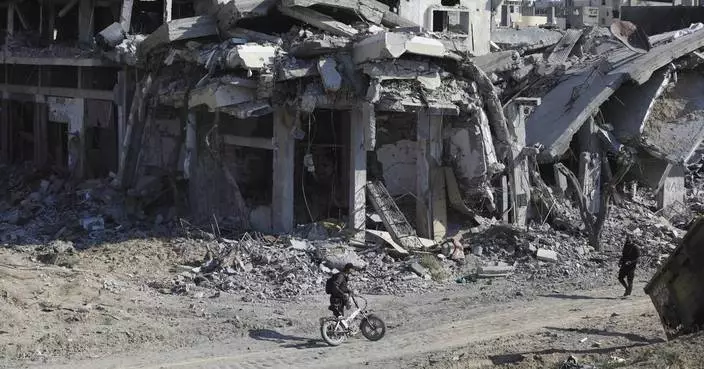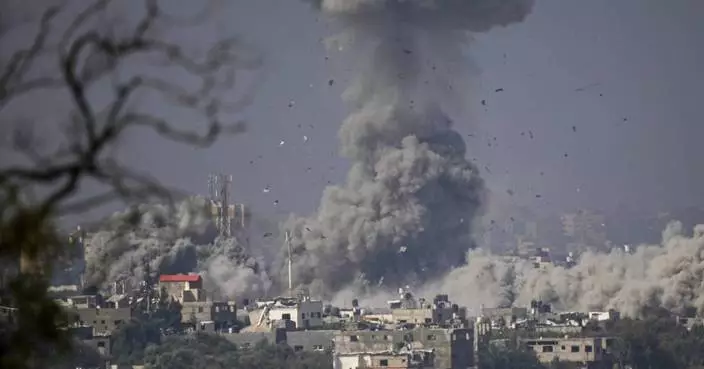Good Friday religious processions in Nicaragua's capital took on a political tone as people seized a rare opportunity to renew protests against the government of President Daniel Ortega.
As hundreds of faithful walked in a traditional Stations of the Cross procession to the city's cathedral, dozens of protesters shouted for "justice" and carried wooden crosses bearing the names of those who died during the past year of protests. They waved the blue-and-white Nicaraguan flag, which has become a symbol of the opposition.
When the protest continued outside the cathedral, riot police moved in to disperse them with deafening sound grenade-type devices and tear gas. Some young protesters threw rocks and sought shelter among the faithful inside the cathedral's gates. Police surrounded the site.
José Pallais, a member of the opposition Civic Alliance who has participated in a dialogue with the government, said the Vatican's ambassador Waldemar Sommertag was mediating between authorities and the opposition to win the safe passage of the protesters out of the cathedral. He was uncertain of how many people were trapped inside the cathedral's grounds.
Pallais said he had heard of two injuries, including a young woman injured by a tear gas canister.
The National Police said in a statement they knew of no injuries and had arrested no one. They said masked protesters armed with rocks, homemade mortars and some with guns infiltrated the procession and then hid on the grounds of the cathedral.
On Wednesday, an overwhelming police presence scuttled a scheduled opposition march to mark the anniversary of the protests. Public demonstrations have been effectively banned since last year.
Friday was the anniversary of the first three deaths after the government and armed supporters moved to quash the protests last year.
The Inter-American Commission on Human Rights says at least 325 people have died in the protests and government crackdown. Protests began in response to social security cuts and expanded to calls for Ortega's ouster.
Ortega has maintained that last year's protests were an attempted coup orchestrated by forces outside the country. International observers have found no evidence of a plot to overthrow of the one-time revolutionary who led the ouster of Anastasio Somoza in 1979.
This week U.S. National Security Adviser John Bolton announced additional sanctions against Nicaragua, European politicians called on the European Union to impose its own and Canada confirmed that it had cut nearly $20 million in direct aid to Ortega's government.
James K. Hill, Canada's ambassador to Nicaragua, Costa Rica and Honduras told the AP this week that repression by Nicaraguan authorities had led to the suspension of the financial support.
"Canada is concerned by the human rights situation and considers the repressive actions of the government unacceptable," Hill said in a written response to the AP.
The government typically uses such direct foreign assistance to support its general budget. Canada suspended the assistance in August, but the government only confirmed it following a news report this week.
Hill said the aid carries conditions and wouldn't be renewed until "there is satisfactory evidence of improvement with respect to the state of human rights in Nicaragua, which would be reported by independent sources."
Canada continues to provide development assistance in Nicaragua — averaging about $15 million annually — through international and non-governmental organizations.
THE HAGUE, Netherlands (AP) — Germany on Tuesday strongly rejected a case brought by Nicaragua at the United Nations' top court accusing Berlin of facilitating breaches of the Geneva Convention and international humanitarian law by providing arms and other support to Israel in its deadly assault on Gaza.
"The minute we look closely, Nicaragua’s accusations fall apart,” Christian Tams, a member of Germany's legal team, told the 16-judge panel at the International Court of Justice.
On Monday, Nicaragua urged judges to order a halt to German military aid to Israel, arguing that Berlin’s support enables acts of genocide and breaches of international humanitarian law in Gaza.
The head of Germany's legal team, Tania von Uslar-Gleichen, said Nicaragua's claims "have no basis in fact or law. They are dependent on an assessment of conduct by Israel, not a party to these proceedings.”
Preliminary hearings held Monday and Tuesday are focused solely on Nicaragua’s request for so-called provisional measures, including a court order for Berlin to halt military and other aid to Israel and reinstate funding to the U.N. aid agency in Gaza.
Closing Germany's arguments, Von Uslar-Gleichen urged judges not to impose preliminary measures and to toss out Nicaragua’s case.
Tams said that Germany had licensed only four exports of weapons of war to Israel since October, “three of which concern test or practice equipment.” He said 98% of military exports to Israel since the Oct. 7 attacks were not weapons of war, but other equipment.
Showing judges a photo of German aid being airdropped over Gaza, Tams added that Berlin continues to provide humanitarian support to Palestinians “every single day under extremely difficult conditions, constructively engaging with international partners.”
Nicaragua's case is the latest legal attempt to rein in Israel's offensive by a country with historic ties to the Palestinian people, after South Africa accused Israel of genocide at the same court late last year. It also comes against a backdrop of growing calls for Israel’s allies to stop supplying the country with weapons — and as some supporters, including Germany, have grown more critical of the war.
Speaking in Berlin, German Foreign Minister Annalena Baerbock told reporters that “from day one after Oct. 7, Germany has faced up to the incredible dilemma that Hamas deliberately entrenched itself behind civilians, deliberately used the human suffering of Palestinians and Palestinians in Gaza to expand its attack on Israel.”
Echoing comments by the German lawyers in court, Baerbock added that Germany is committed to international law, including the right to self-defense.
“This means that Israel has the right to defend itself, like every country in the world, against these terrorist attacks that continue to be carried out with the aim of destroying Israel as a state,” she said.
At Monday's hearings, Nicaragua’s Ambassador to the Netherlands, Carlos José Argüello Gómez, accused Germany of “failing to honor its own obligation to prevent genocide or to ensure respect of international humanitarian law.”
However, another lawyer for Germany, Samuel Wordsworth, argued that the court could not rule Germany was violating the obligation to prevent genocide because its judges have not ruled that Israel is breaching the Genocide Convention.
In a preliminary phase of the case brought late last year by South Africa, the U.N. court has said that it is “plausible” that Israel's actions in Gaza could amount to breaches of the convention.
“How can it be said that there was a failure to ensure respect of a third state, if the failure on the part of that third state to respect is not established in the first place?” Wordsworth said.
The court will likely take weeks to deliver its preliminary decision, and Nicaragua’s case will probably drag on for years.
Israel strongly denies that its assault amounts to genocidal acts, saying it is acting in self defense after Hamas-led militants stormed into southern Israel on Oct. 7, killing some 1,200 people.
Since then, more than 33,000 Palestinians have been killed in Gaza, according to the territory’s Health Ministry. Its toll doesn’t differentiate between civilians and combatants, but it has said women and children make up the majority of the dead.
According to the Stockholm International Peace Research Institute, Germany is second only to the U.S. in supplying arms to Israel — but it would be harder, if not impossible, for the U.S. to be brought before the court because Washington does not recognize the ICJ’s power to compel countries to appear before it. The U.S. also has not signed a protocol to the Genocide Convention that allows countries to bring disputes to the court.
Associated Press writer Kirsten Grieshaber in Berlin contributed to this report.
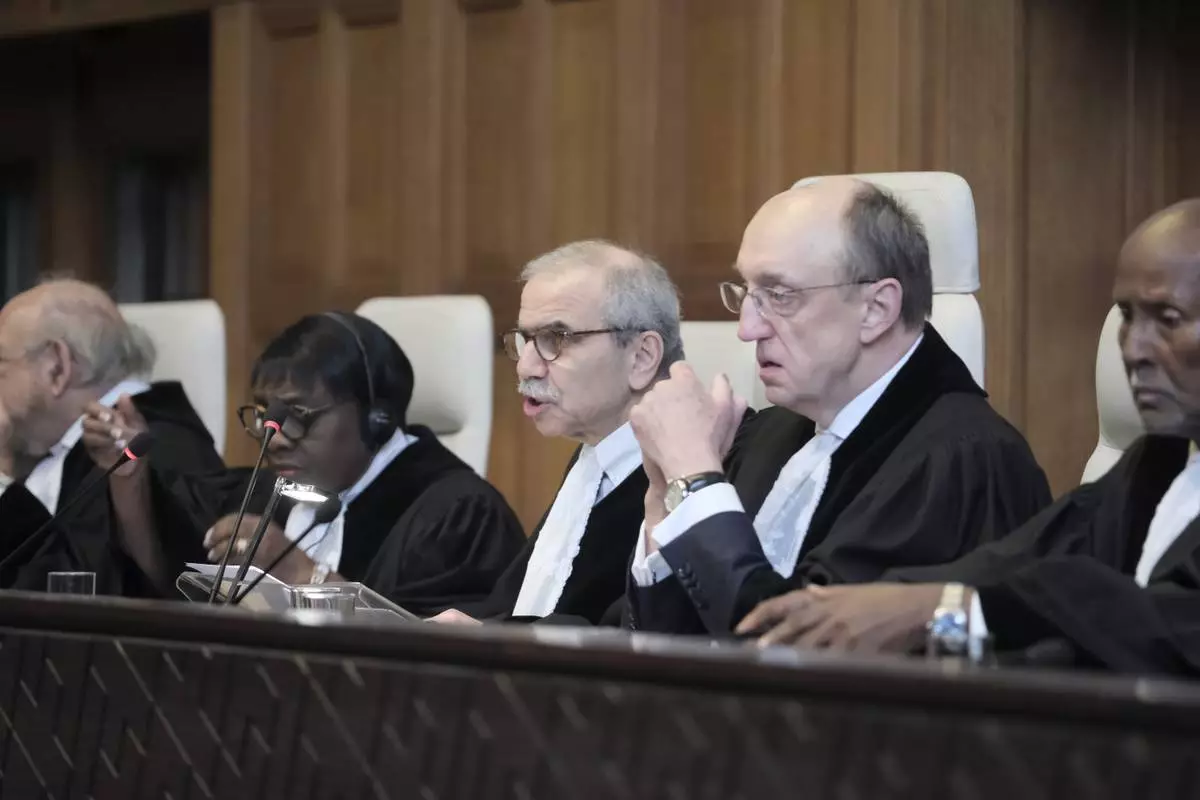
Judge Nawaf Salam, center, speaks at the start of a two days hearing at the World Court in The Hague, Netherlands, Monday, April 8, 2024, in a case brought by Nicaragua accusing Germany of breaching the genocide convention by providing arms and support to Israel. (AP Photo/Patrick Post)
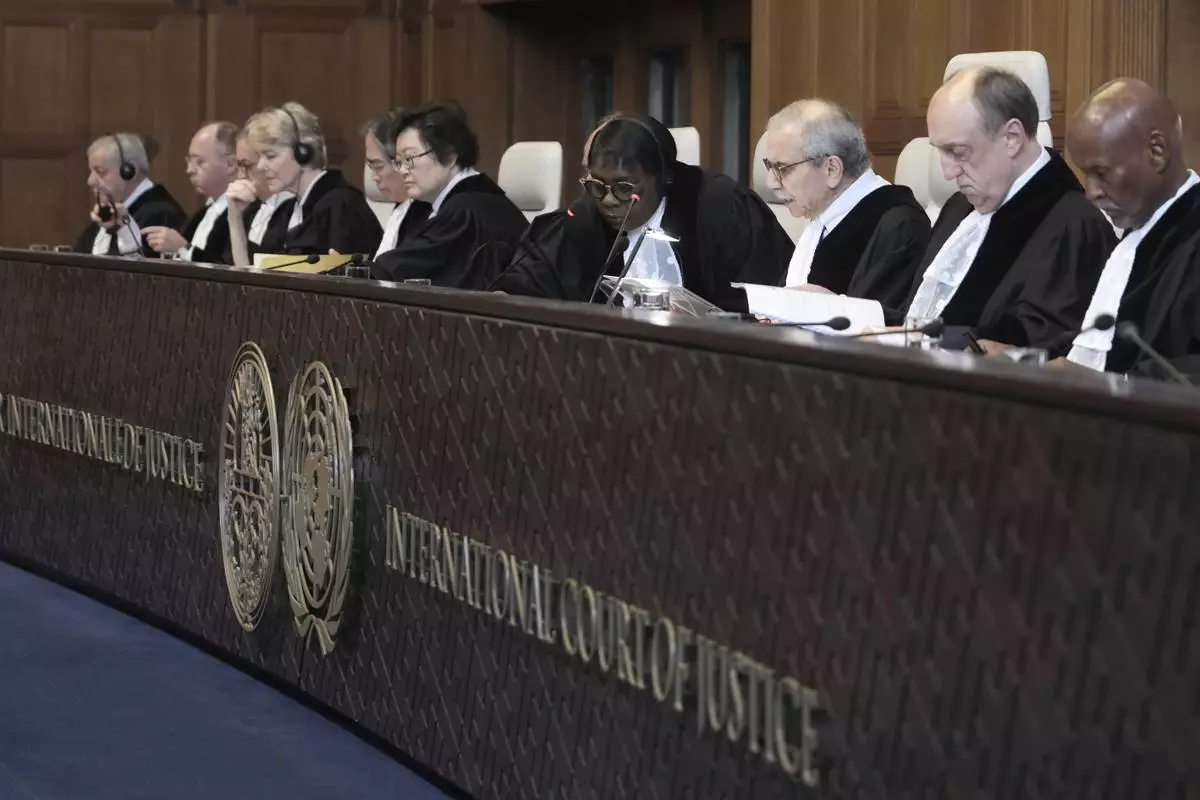
Judge Nawaf Salam, third right, speaks at the start of a two days hearing at the World Court in The Hague, Netherlands, Monday, April 8, 2024, in a case brought by Nicaragua accusing Germany of breaching the genocide convention by providing arms and support to Israel. (AP Photo/Patrick Post)
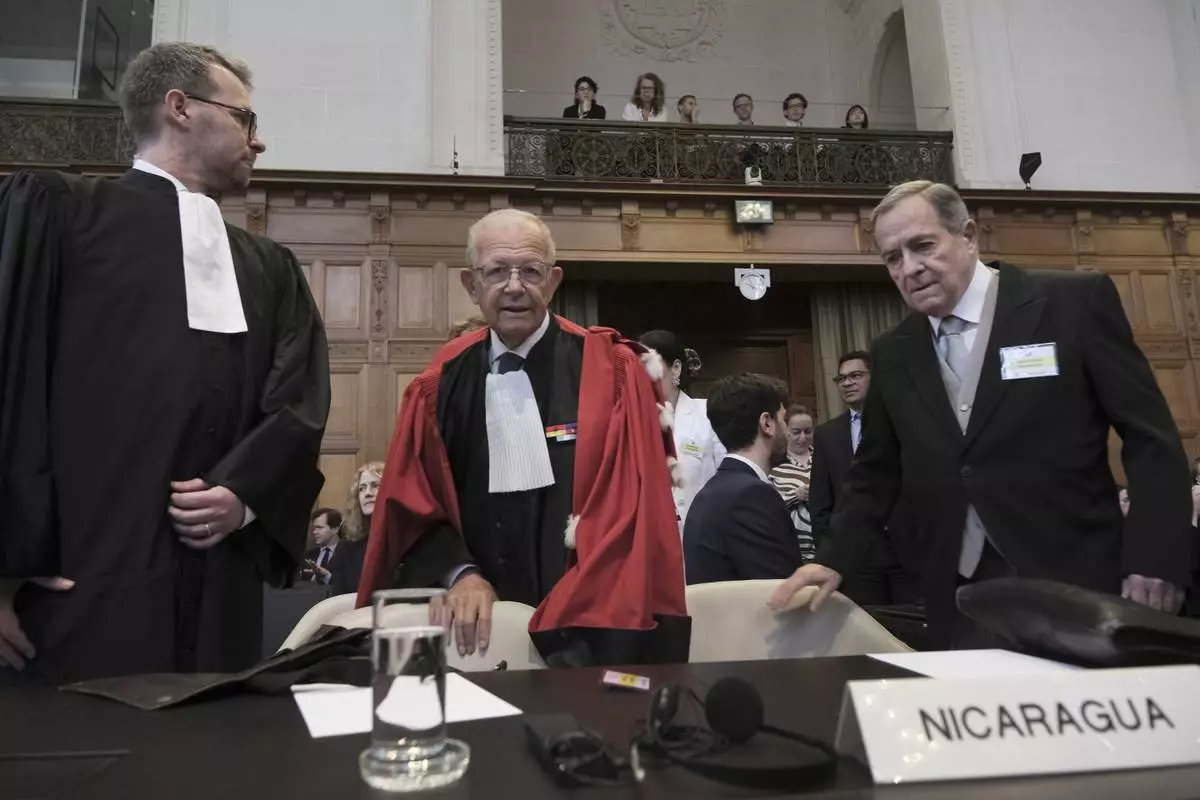
Nicaragua's Ambassador Carlos Jose Arguello Gomez, right, and Alain Pellet, center, a lawyer representing Nicaragua, arrive for the start of a two days hearing at the World Court in The Hague, Netherlands, Monday, April 8, 2024, in a case brought by Nicaragua accusing Germany of breaching the genocide convention by providing arms and support to Israel. (AP Photo/Patrick Post)

Tania von Uslar-Gleichen, Germany's legal adviser and Director-General for Legal Affairs of the German Foreign Ministry, center, shakes hands with Alain Pellet, left, a lawyer representing Nicaragua, prior to the start of a two days hearing at the World Court in The Hague, Netherlands, Monday, April 8, 2024, in a case brought by Nicaragua accusing Germany of breaching the genocide convention by providing arms and support to Israel. (AP Photo/Patrick Post)
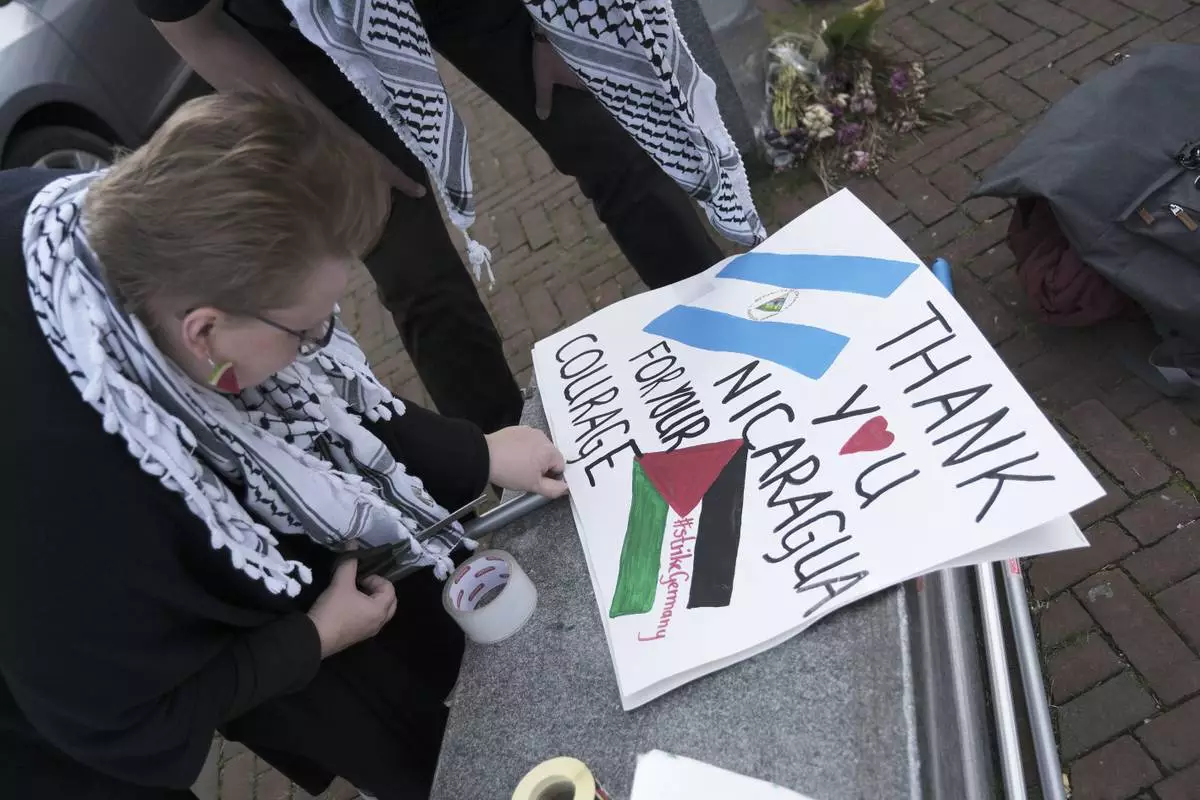
A pro-Palestinian activist works on a protest poster near the International Court of Justice, or World Court, in The Hague, Netherlands, Monday, April 8, 2024, prior to the start of a two days hearing in a case brought by Nicaragua accusing Germany of breaching the genocide convention by providing arms and support to Israel. (AP Photo/Patrick Post)
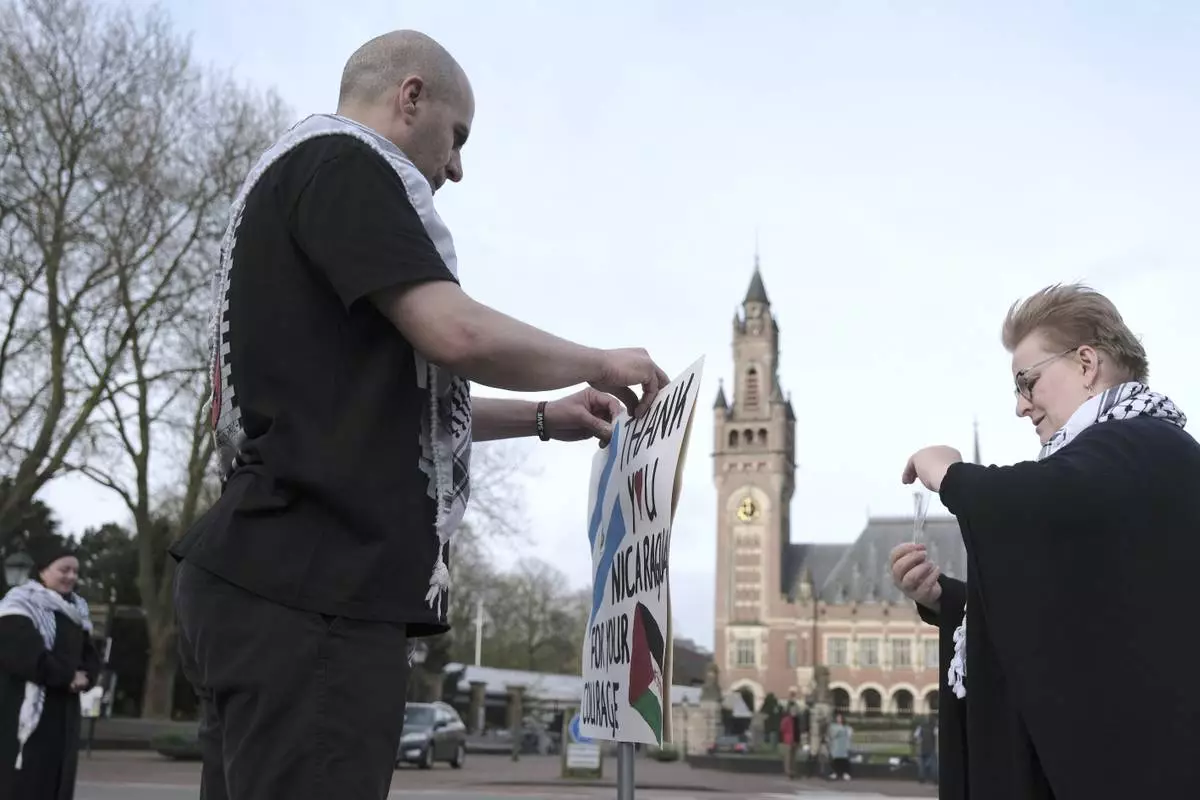
A pro-Palestinian activist works on a protest poster near the International Court of Justice, or World Court, in The Hague, Netherlands, Monday, April 8, 2024, prior to the start of a two days hearing in a case brought by Nicaragua accusing Germany of breaching the genocide convention by providing arms and support to Israel. (AP Photo/Patrick Post)









